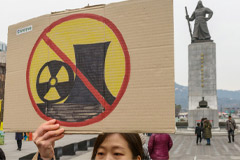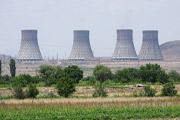Analysis + Opinion | 2024
 |
Analysis + OpinionJuly 22, 2024The Greenhill approach and the taxology of instrumentalized migration in the Belarusian migration crisisRóbert GöncziWarsaw InstituteThe deliberate use of migration as a geopolitical instrument has attracted a lot of attention lately, especially when described by Kelly Greenhill's taxonomy of engineered migration. |
 |
Analysis + OpinionJuly 11, 2024Japan’s intelligence capabilities with Richard J SamuelsRobert WardInternational Institute for Strategic StudiesRichard Samuels, Ford International Professor of Political Science, joins leading experts to discuss the history, current, and potential threats of Japan’s intelligence capabilities. |
 |
Analysis + OpinionJuly 9, 2024Thousands of Afghans fought with the US against the Taliban. Why have they been forgotten?Anjana SankarThe Boston GlobeAmong the many migrants showing up at the US-Mexico border are Afghans who still hope America will come through on its promises to them, writes Anjana Sankar, the Center's IWMF Elizabeth Neuffer Fellow, for the Boston Globe. |
 |
Analysis + OpinionJuly 8, 2024How would Trump and Biden handle US nuclear policy upon reelection?Caitlin TalmadgeBrookingsFew issues are as potentially consequential as U.S. nuclear policy. What are Donald Trump and Joe Biden likely to do with respect to deterrence and arms control if reelected? Their previous terms in office suggest important differences—not only on specific nuclear policy issues but also in their overall approach to managing nuclear risk. |
 |
Analysis + OpinionJune 18, 2024Fear factor: How to know when you’re in a security dilemmaCharles L. GlaserForeign AffairsSSP senior fellow, Charles L. Glaser, writes on security dilemmas and how the US should react when they arise. |
 |
Analysis + OpinionApril 22, 2024In the Israel-Iran standoff, it’s not about direct deterrenceNasir AlmasriMiddle East InstituteSSP PhD candidate Nasir Almasri writes on how Palestinian statehood bid fails at the UN because of US veto. |
 |
Analysis + OpinionApril 16, 2024Dousing South Korea’s nuclear desiresJames D KimEast Asia ForumSouth Korea's desire for their own nuclear weapons is anticipated to lessen as war survivors pass away and succeeding, less war-fearing generations grow their political influence. As a result, nuclear non-proliferation policies could potentially become more effective, granted the security environment adapts. |
 |
Analysis + OpinionApril 12, 2024A daughter of a refugee repays kindness by hosting migrantsAnjana SankarBoston GlobeOver the past year, thousands of migrants have flowed into Massachusetts from a tide of millions fleeing poverty, crime, war, or dictatorship in the Caribbean, Ukraine, Latin America, and Asia. The influx has overwhelmed the state's emergency shelter system, prompting Governor Maura Healey to urge homeowners to take in migrant families temporarily, writes Anjana Sankar, the Center's IWMF Elizabeth Neuffer Fellow, for the Boston Globe. |
 |
Analysis + OpinionMarch 21, 2024Arriving at a crossroads: Can Europe avoid replaying the policy failures of the 2014-16 migration crisis?Kelly M Greenhill and Hugo BradyGeorgetown Journal of International AffairsAs irregular migration numbers once again soar to historic levels, Europe’s migration challenges remain a difficult challenge to surmount. After years of infighting and foot-dragging, an agreement on a long-stalled asylum pact was finally reached. However, more needs to be done to enhance future European cooperation around migration management and border protection. |
 |
Analysis + OpinionMarch 14, 2024Power and governance in the age of AIGordon LaForge, Allison Stanger, Sarah Myers West, Bruce Schneier, Stephanie Forrest, and Nazli ChoucriNew AmericaThe influence of artificial intelligence (AI) on our world is growing. In early 2024, New America brought together experts in international relations, computer science, and technology policy to share their thinking on how governments and institutions should navigate AI to harness its strengths and mitigate its risks. |
 |
Analysis + OpinionFebruary 14, 2024The devastation of Gaza was inevitableBarry PosenForeign Policy MagazineThe Israeli offensive in Gaza, the US-led coalition offensives in Mosul and Raqqa, and even the bloody and clumsy Russian siege of Mariupol may not be anomalies. Instead, they are a window into future war. |
 |
Analysis + OpinionFebruary 5, 2024Neighborhoods and health: Interventions at the neighborhood level could help advance health equityMariana C Arcaya, Ingrid Gould Ellen, and Justin SteilHealth AffairsTo understand how housing affects health and health equity, the role of neighborhood environments must be considered. |
 |
Analysis + OpinionFebruary 1, 2024Coordinated dis-coordinationMai HassanCambridge University PressDissidents mobilizing against a repressive regime benefit from using public information for tactical coordination since widespread knowledge about an upcoming event can increase participation. But public calls to protest make dissidents’ anticipated activities legible to the regime, allowing security forces to better stifle mobilization. |
 |
Analysis + OpinionJanuary 31, 2024How nuclear power saved ArmeniaAreg DanagoulianBulletin of the Atomic ScientistsA short history of Armenia's relationship with nuclear power. |
 |
Analysis + OpinionJanuary 19, 2024Preparing for the uncertain future of US-Russia arms controlSarah BidgoodPerry World HouseDespite their intense rivalry, Washington and Moscow have a long history of successful cooperation to reduce the threats posed by nuclear weapons. |


